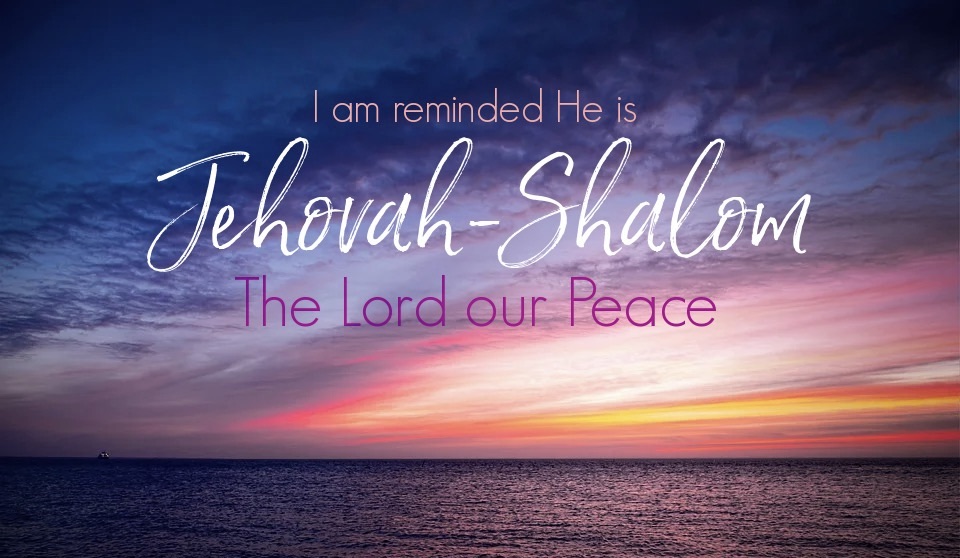Learning From The Peace Offering

There is so much to learn from the traditions and behavior of the nation of Israel in the Old Testament. Unfortunately, many Christians today neglect it, for various reasons, despite the fact that it can benefit those who truly want to be centered in their relationship with God. Simply put, ignorance may hinder our ability to come closer to God today.
Consider how loosely we use the word peace today. It is more than a nice way to interject a kind feeling to others or ourselves and it carried a great significance to biblical writers. When they used the word it related to an expression of gratitude and a projection of comfort for God’s blessing when given either to God or to a person. If there ever was a time that we needed peace in our lives and the world it’s now. Unfortunately, people have lost the true meaning of saying the word to others as it lacks the idea of harmony with God as it did in the past.
There are over 700 direct verses of scripture with the word translated peace in the entire bible, which comes from the word “Shalom”. The word peace was used before the law was given to Moses as its meaning was basically the idea of desiring ”Harmony” towards a person.
God spoke to Moses about making an altar for sacrifice where atonement for sin could be offered or a sacrifice of thanksgiving could be made. The Jews had so many mixed practices and ideas of worship with other gods that the Lord wanted to lead them from confusion about who he was and their obligation towards him as the people of God. Sadly, I feel many people professing Christianity as their faith think, and have often been taught, that our faith in Christ and God the Father is a one way street where God gives and we don’t. God was teaching the nation of Israel the importance of sacrifice and the reason for it, especially in the peace offering.
Exodus 20:24
You shall make an altar of earth for Me, and you shall sacrifice on it your burnt offerings and your peace offerings, your sheep and your oxen; in every place where I cause My name to be remembered, I will come to you and bless you.
God prescribed coming into his presence for forgiveness and for expressing thankfulness. Both are necessary for meaningful relationship with our creator.
The peace offering was given under three circumstances — for thanksgiving, upon the payment of a vow, or as a free expression of the worshiper’s goodwill. Freewill offerings were given in response to God’s unexpected or unsought generosity. Even today, we often do peace offering with each other in order to try to smooth things over with someone we have a strained relationship with by giving them a gift, which we can call a peace offering. After fighting with your friend, you might take him out for ice cream as a peace offering. This is done as an attempt to pacify a heated situation in the hope of bringing a mended relationship.
The Hebrew word “Shalom” means much more than the English word “peace“, and includes the concepts of harmony, health, and prosperity.
God had much to do in straightening out the screwed up thinking of the Jewish people after living 400 years in slavery in the land of Egypt. He attempted to stress the importance of not only the act but also the motive of the person bring the peace offering. God wanted people to value him as their God and provide them with a sense of value in the quality of the gift thus requiring “First Fruit” of unblemished sacrifice.
Leviticus 3:1
Now if his offering is a sacrifice of peace offerings, if he is going to offer out of the herd, whether male or female, he shall offer it without defect before the LORD.
Remember the “Peace Offering” was also called a “Thank Offering”. This was an offering of “Gratitude” because it symbolizes peace with God and man. In the book of Leviticus, Moses wrote that the correct offering by the giver became a pleasant smell to God, meaning he appreciated and delighted in the offering because the giver did so with careful intent.
Lev 3:5
A “Soothing Aroma” to God. The offering was pleasant to the Lord because it represented the idea of “thank you”.
God didn’t just want his people to be careful in what and how they gave offerings to him. He wanted them, from the greatest to the least, to realize that God was teaching them how to be thankful and how to treat each other. God gave specific instructions to Aaron the high priest to speak a “Blessing of Peace” on the people of Israel and instill in them an understanding they were to bless each other.
Numbers 6:25-26
The LORD make His face shine on you, and be gracious to you;
The LORD lift up His countenance on you, and give you peace.
King David wrote in the Psalms about being able to go to bed and sleep because he had made the Lord his provider and protector. David was responding to the peace offering and the words of Aaron’s blessing over Israel in his personal prayers. This whole process of receiving and giving a blessing of peace was intended for all the people who truly have a walk with God since a blessing required an expressions of sacrifice that revealed our heart towards God. Giving a blessing is how we should respond to each other today. If someone has blessed our lives in friendship, shouldn’t we express it tangibly rather than just keeping the thoughts of gratitude to ourselves?
Psalms 4:8
In peace I will both lie down and sleep, for You alone, O LORD, make me to dwell in safety.
David wrote the psalms for Israel to sing aloud so that by being vocal with their gratitude they would strengthen their reliance and devotion to God and the Lord and in turn would be free to bless others.
Psalms 29:11
The LORD will give strength to His people; The LORD will bless His people with peace.
I think and fear that we have lost the great desire of Jesus to impart peace into our souls and to be able to give such peace away. We let the world impart fear and hatred into our minds through wars and conflict so much that we lost our focus and reliance on God. Jesus wanted his disciples to realize that “IN HIM” we have peace regardless of how the world falls apart around us. Jesus didn’t say he will give us a life without conflict and struggle but that his peace would be available in the midst of a crumbling world around us.
John 16:33
These things I have spoken to you, so that in Me you may have peace. In the world you have tribulation, but take courage; I have overcome the world
The apostle Paul also wrote about Jesus making a way of peace for us because of what he did on the cross. I think few truly appreciate what Paul is saying or even meaning in this verse but in spite of our ignorance Jesus made a way for us to have peace.
Colossians 1:19-20
For it was the Father’s good pleasure for all the fullness to dwell in Him, ( Jesus ) and through Him to reconcile all things to Himself, having made peace through the blood of His cross; through Him, I say, whether things on earth or things in heaven.
Think about the time when Jesus was crucified and the disciples were freaking out. They were full of fear and doubt and then Jesus shows up after the resurrection. I wish I had been there to see the expressions on the disciple’s faces. They didn’t earn God’s peace but received his peace. Can you imagine the gratitude they must have felt? John says Jesus had to say it again – “Peace Be With You” because I’m sure they couldn’t believe the kindness of God on their behalf.
John 20:19-21
On the evening of that first day of the week, when the disciples were together, with the doors locked for fear of the Jewish leaders, Jesus came and stood among them and said, “Peace be with you!” After he said this, he showed them his hands and side. The disciples were overjoyed when they saw the Lord. Again Jesus said, “Peace be with you! As the Father has sent me, I am sending you.”
So, when it was evening on that day, the first day of the week, and when the doors were shut where the disciples were for fear of the Jews, Jesus came and stood in their midst and said to them, “Peace be with you” and when He had said this He showed them both His hands and His side. The disciples then rejoiced when they saw the Lord. Jesus said to them again, Peace be with you; as the Father has sent Me, I also send you.
Maybe the lesson we should learn from this study on peace offerings and God’s desire to grant us peace is that we have a part to play in receiving peace and giving peace. We can be full of doubt and fear with all the mess around us or we can respond to God’s offer of peace right now and receive it. God’s peace is not forced on us, it must be received by us to have its effect.
Secondly, we can respond to God’s heart and be givers of peace. We can extend God’s hand by imparting His heart as we are full of gratitude by touching the people that come across our path, whether in church or outside its walls, with acts of gratitude. God calls us to offer sacrifices of time, money or even small gestures like cookies to others. Couldn’t we invest a sacrifice of kind words of encouragement, or even prophetic words, to those who desperately need them? In any case, learn from what God prescribed in the Old and New Testament and give the peace of God away to a lost and dying world and see the peace we have get multiplied to those who desperately need it.
Questions:
1) Have you realized that God still requires us to give offerings of peace to others that we might be a sweet aroma to him? (2 Cor 2:15-16) speaks of the fragrance of Christ through us.
2) Is it your desire to give God offerings of thanksgiving by being a blessing to others that they in turn might receive the peace of God? It starts with seeing the value of others and then extending your words and actions towards them in the name of Jesus.
May th Holy Spirit “Inspire” us to be a sweet aroma to God in a lost world,
Pastor Dale




Leave a Comment